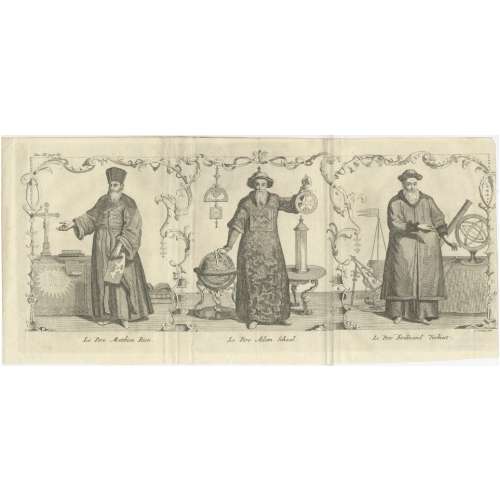Three priests: Le Pere Matthieu Ricci, Le Pere Adam Schaal, and Le Pere Ferdinand Verbiest. Three priests with navigational instruments. Image taken from Description geographique, historique, chronologique et physique de l'Empire de la Chine et de la Tartarie Chinoise. Enrichies des cartes generales et particulieres de ces pays, etc. by Jean-Baptiste Du Halde (1674–1743), vol. 3, page 78. Originally published/produced in La Haye [The Hague], 1736. J.v.Solingen fecit
Jean-Baptiste Du Halde (Chinese: 杜赫德; 1 February 1674 – 18 August 1743) was a French Jesuit historian specializing in China. He did not travel to China, but collected seventeen Jesuit missionaries' reports and provided an encyclopedic survey of the history, culture and society of China and "Chinese Tartary," that is, Manchuria. Voltaire said of Du Halde's work: "Although it is developed out of Paris, and he hath not known the Chinese, [he] gave on the basis of the memoirs of his colleagues, the widest and the best description the empire of China has had worldwide." Le Pere Matthieu Ricci, a.k.a. Matteo Ricci, S.J. (Italian pronunciation: [matˈtɛːo ˈrittʃi]; Latin: Mattheus Riccius Maceratensis; 6 October 1552 – 11 May 1610), was an Italian Jesuit priest and one of the founding figures of the Jesuit China missions. His 1602 map of the world in Chinese characters introduced the findings of European exploration to East Asia. He is considered a Servant of God by the Roman Catholic Church. Ricci arrived at the Portuguese settlement of Macau in 1582 where he began his missionary work in China. He became the first European to enter the Forbidden City of Beijing in 1601 when invited by the Wanli Emperor, who sought his services in matters such as court astronomy and calendrical science. He converted several prominent Chinese officials to Catholicism, such as Xu Guangqi, who aided in translating Euclid's Elements into Chinese as well as the Confucian classics into Latin for the first time. Le Pere Adam Schaal, a.k.a. Johann Adam Schall von Bell (1 May 1591 – 15 August 1666) was a German Jesuit and astronomer. He spent most of his life as a missionary in China (where he is remembered as "Tang Ruowang") and became an adviser to the Shunzhi Emperor of the Qing dynasty. Le Pere Ferdinand Verbiest, a.k.a. Father Ferdinand Verbiest (9 October 1623 – 28 January 1688) was a Flemish Jesuit missionary in China during the Qing dynasty. He was born in Pittem near Tielt in the County of Flanders (now part of Belgium). He is known as Nan Huairen (南懷仁) in Chinese. He was an accomplished mathematician and astronomer and proved to the court of the Kangxi Emperor that European astronomy was more accurate than Chinese astronomy. He then corrected the Chinese calendar and was later asked to rebuild and re-equip the Beijing Ancient Observatory, being given the role of Head of the Mathematical Board and Director of the Observatory. He became close friends with the Kangxi Emperor, who frequently requested his teaching, in geometry, philosophy and music. Verbiest worked as a diplomat and cartographer, and also as a translator because he spoke Latin, German, Dutch, Spanish, Hebrew, and Italian. He wrote more than thirty books. During the 1670s, Verbiest designed what some claim to be the first ever self-propelled vehicle – many claims this as the world's first automobile, in spite of its small size and the lack of evidence that it was actually built.Joshua Van Solingen was an engraver and publisher from Holland, working, besides other places, in Scotland. Information about him can be found at Catastrophic Bliss (The Griot Project Book Series) by Accounting in Scotland (RLE Accounting): A Historical Bibliography History of the Scottish Metrical Psalms: With an Account of the Paraphrases ... The History of Edinburgh, from the Earliest Accounts to the Present Time ... History of the Bassandyne Bible, the First Printed in Scotland: With Notices ...



